How to Use a Chamber With a Mouthpiece
Follow these simple instructions or download our full instructions.
Based on your language, we suggest to change your settings to: En fonction de votre langue, nous vous suggérons de modifier vos paramètres comme suit :
Yes, that's correct Oui, c'est correct.Use of a spacer is a simple and effective way to help improve the use of your inhaler. Spacers help to ensure that your medicine reaches your lungs where it’s needed and limits the amount that ends up in the back of the throat1.
Follow these simple instructions or download our full instructions.
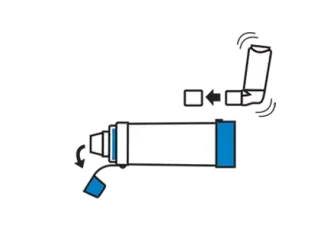
Remove caps from inhaler and chamber. Shake the inhaler immediately before use as per the instructions supplied with it.

Insert the inhaler into the backpiece of the chamber. Put mouthpiece into mouth and close lips around it to ensure an effective seal.
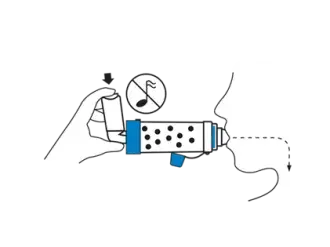
Exhale and press the inhaler once at the beginning of inhalation. Inhale slowly and deeply through the chamber until a full breath has been taken. Hold your breath for 5-10 seconds before exhaling. OR Exhale and press the inhaler once at the beginning of a slow inhalation. Breathe in and out through the chamber for 2-3 breaths keeping lips sealed around chamber mouthpiece.
Follow these simple instructions or download our full instructions.

Remove caps from inhaler and chamber. Shake the inhaler immediately before use as per the instructions supplied with it.

Insert the inhaler into the backpiece of the chamber. Apply mask to face and ensure an effective seal.
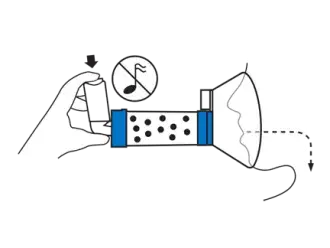
Exhale and press the inhaler once at the beginning of a slow inhalation. Hold mask in place and breathe in and out through the chamber for 5-6 breaths.
Follow these simple instructions or download our full instructions.
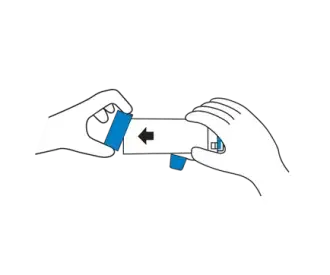
Remove the backpiece only. Do not tamper with valve during cleaning or disassemble the product beyond what is recommended or damage may result. For mask product, do not remove mask.
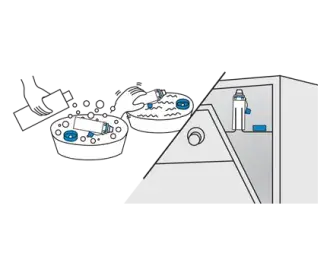
Soak the parts for 15 minutes in a mild solution of liquid dish detergent and lukewarm clean water. Agitate gently. Rinse parts in clean water. OR Place parts in top rack of dishwasher. Ensure product is securely placed face up. Run the dishwasher on a normal or light cycle and avoid heated dry

Shake out excess water from the parts and allow to air dry in a vertical position. Ensure parts are dry before reassembly.
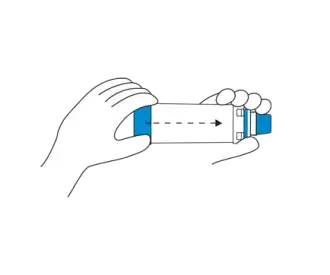
To reassemble, press firmly to attach the backpiece. For mouthpiece models, the protective cap should always be placed on the mouthpiece when the product is not in use.
Trudell Medical International has an enviable history of strong leadership in creating innovative medical devices that enhance the quality of life for people of all ages - all backed by science and clinical evidence.
The safety and efficacy of AeroChamber Plus® brand of chambers is validated in numerous third-party clinical evaluations with different patient populations with different MDIs.1 It is the most studied brand of spacer; supported by hundreds of in-vitro and in-vivo studies and is listed in the prescribing instructions for most MDIs.
Investigated the influence of reducing electrostatic charge on the bronchodilator response to albuterol inhaler during nocturnal bronchospasm. Seven adults (18–40 years) with nocturnal bronchospasm were randomized to receive treatment via AeroChamber Plus® chamber or anti-static AeroChamber Plus® Z-STAT® chamber.
Delivery of albuterol through an anti-static chamber provides a clinically relevant improvement in bronchodilator response during acute, reversible bronchospasm. Bronchodilator response increased by 21–25%. This study highlights the importance of using an anti-static spacer device.
Full Citation: Response to albuterol mdi delivered through an anti-static chamber during nocturnal bronchospasm. Prabhakaran s, shuster j, chesrown s, hendeles l. Respir care 2012;57(8):1291-1296.
This in-vitro study evaluated the effect of the AeroChamber Plus® and AeroChamber Plus® Z-STAT™ valved spacer devices each with either a small or medium facemask on delivery of albuterol (ventolin† hfa) to an oral-breathing face model. The findings from this in-vitro study have shown that even at low flow rates and extended delay times, potentially experienced in real-world situations with young children, drug remains available at the patient interface from either valved holding chamber /facemask combination.
The findings from this in vitro study using flovent-44 hfa with both the AeroChamber Plus® and AeroChamber Plus® Z-STAT™ valved holding chambers with pediatric facemasks has shown that even at low flow rates and extended delay times potentially experienced in real-life situations with young children, drug remains available at the patient interface from either vhc/facemask combination.